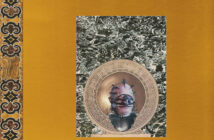
The esoteric funk, jazz and other fun junk archival division of EM Records in Japan salvaged a real treasure on its last beachcombing expedition, a one-off recording from 1978 by Bharat Karki and his ten-man, five-vocalist band (an impressive number of singers considering the album is basically instrumental).
The Beatles and the Maharishi aside, rock´n´roll didn´t make an impression on popular Indian music until the early eighties, according to its historians. Nowadays, foreign adaptation is common and quick – look at global hip-hop. In the late seventies, it was still on time-delay. But Karki, whomever he was, must have had his ear tuned to some wide-ranging radio stations, or had an uncle bringing him back records from abroad, because he picked up, absorbed and reimagined an “international music” bursting with psychedlic rock, funk and a dose of Latin and Arabic pop.
International Music opens with the pious Hindu ´Om Namah Shivaya´ chant, before ´A Trip to Katmandu´ peels out at a speed and never slows down. The pleasantly tinny recording is utterly saturated with sound, but captures both the precarious electric organ and contemporary state of technology in a time capsule forever. A garage rock band´s drum kit is fleshed out with domestic skins (although the enthusiastic drummer really doesn´t need any help) and the electric strings are joined by a sitar.
Karki´s arrangements are luscious and meant to be danced to (without a hint of filmi anywhere) – the flute, the surf guitar of´Calcutta Calcutta´, the bongo fury of ´Come on Dance with Me´, the bar-mitzvah band saxophone boogie on ´Forget Me Not´. ´Dancing Rope´ and ´Arabika´ both sound like they´ve been purloined from Looney Tunes bazaar and snake-charmer scenes – but for that knavish organ pumping away. Only twenty minutes later, the band wraps up with ´In Loving You´, a big, smiling wave good night.
Aside from being so very entertaining, International Music raises the fascinating prospect of an Indian take on exotica, in David Toop´s sense of â€fabricated, remotes zones of pleasure and peace†culled by the West from the enchanted lands it colonizedâ€. While normally deplored for being bowdlerized and suburbanized, there are also positive aspects of creative misapprehension and praise by assimilation. Karki was surely aiming at his own suburban market – what does that tell us about reverse World Music?
Great party. Thanks, Mr. Karki, wherever you are.
Stephen Fruitman



